'I want to live': Mental illness hasn't stopped Maricella Ramirez
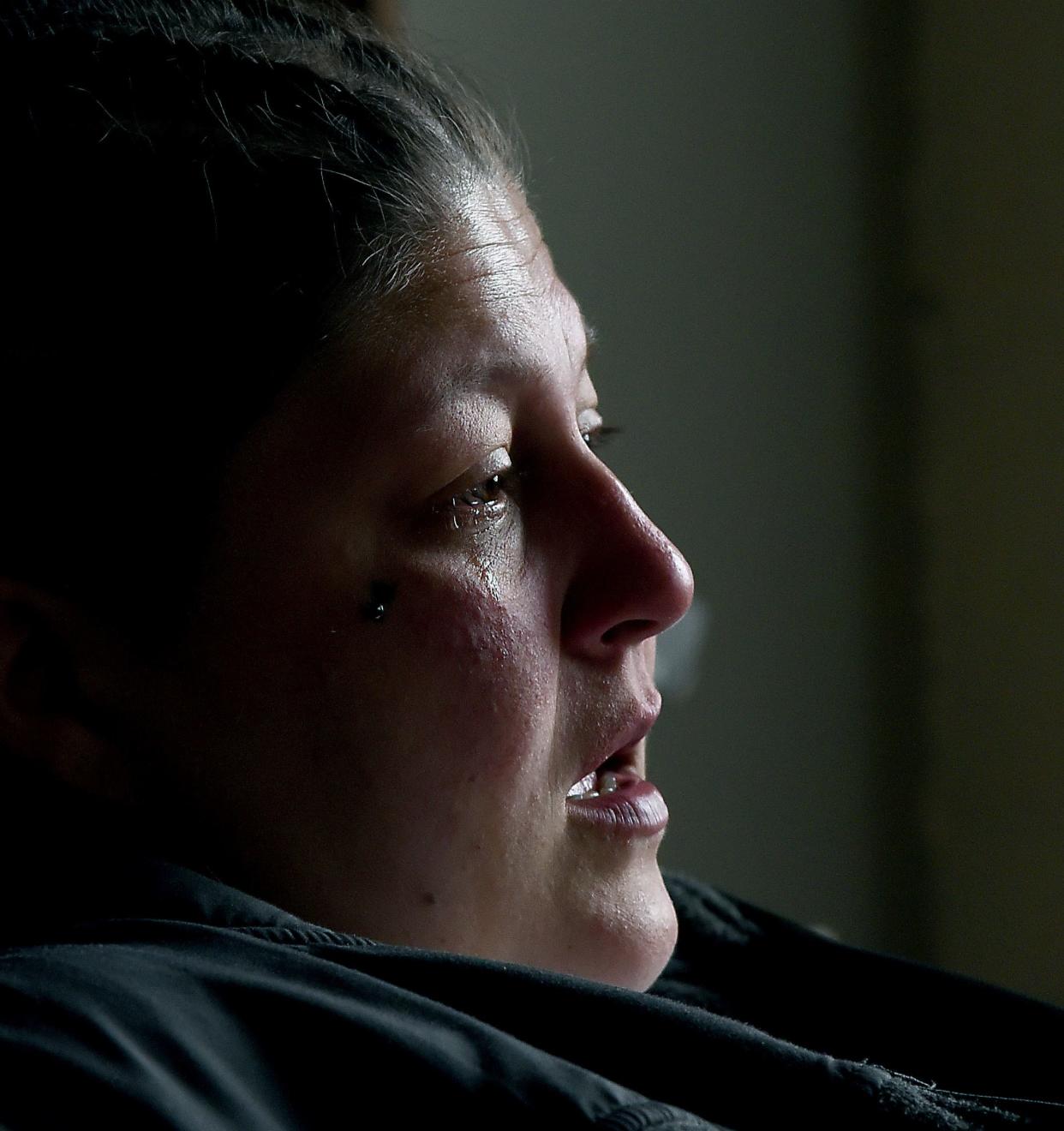
- Oops!Something went wrong.Please try again later.
EDITOR'S NOTE: This article contains descriptions of mental illness, suicide and some violence. It may be disturbing to some readers.
MONROE — In the upstairs library of the Oaks Homeless Shelter, Maricella Ramirez sat in the corner and sobbed.
“I don’t want to survive. I want to live,” she whispered, wiping tears from her eyes.
The 34-year-old has struggled with mental illness more than half her life. She was diagnosed with depression at age 13.
In January, Ramirez and her daughter, P’rrllis, an energetic, ginger-haired 4-year-old, moved into the shelter. They had nowhere else to go.
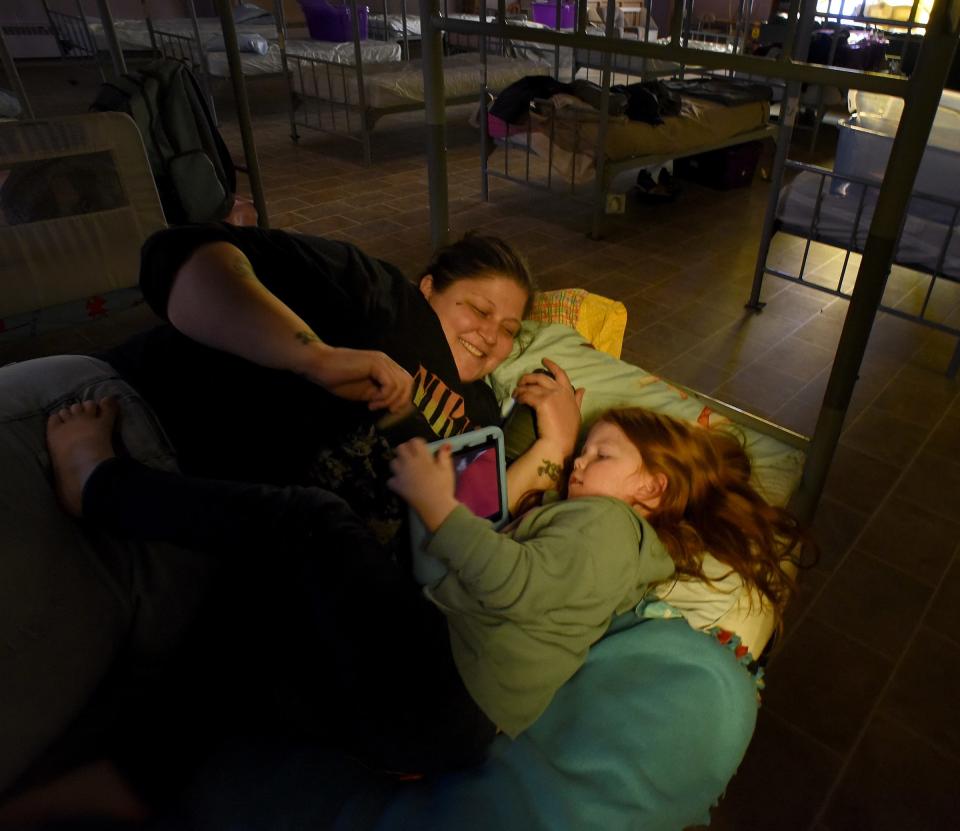
“I grew up in southwest Detroit," Ramirez said. "I started struggling with mental illness when I was 11. My father was extremely abusive to me, my mom and my brothers. He was also a drug addict."
She remembers once, in a span of 18 months, the family moved 17 times.
“We never really had a place to call home. My father went to prison when I was 11, and I started getting depressed. I wasn’t getting the attention I needed at home. I had recurring dreams that I couldn't talk to anyone about. I felt like no one cared about me. No one loved me.”
As she recalls her childhood, Ramirez's body language begins to change. She crosses her arms tightly across her chest with clenched fists. She tries to calm herself down.
“I was a big girl. I got made fun of. I was bullied and teased. There were times when we didn’t have hot water and electricity so I didn’t have clean clothes or was able to bathe,” she said.
At 13, she moved out and started staying with friends. When her friends moved out, her mother moved in, because the rent was cheaper.
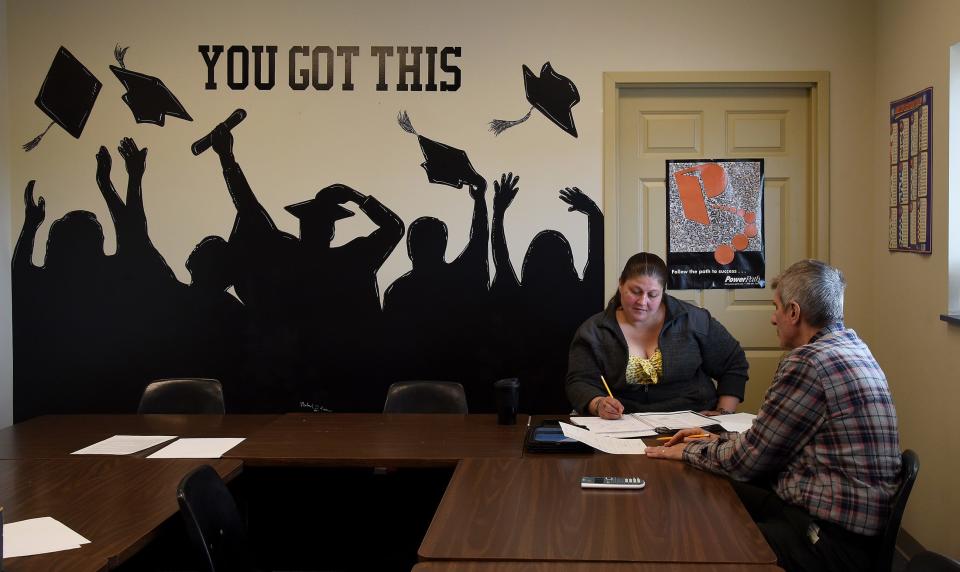
Thoughts of suicide
Eventually, Ramirez was hospitalized for depression. She started thinking about suicide.
“What am I worth? I’d been told I was worthless and no good and that I was dumber than a box of rocks,” she said. “Who tells me otherwise? Myself? I was 450 pounds. I was overeating. I wasn’t going to school. It was rough. I was hospitalized for three weeks, then I was home for a few days and they sent me back.”
She was hospitalized at a mental health facility in Northville for six months before going to live at Children’s Home of Detroit. After returning home for a brief time, she went to an alternative home for girls, where she worked and tried to finish high school.
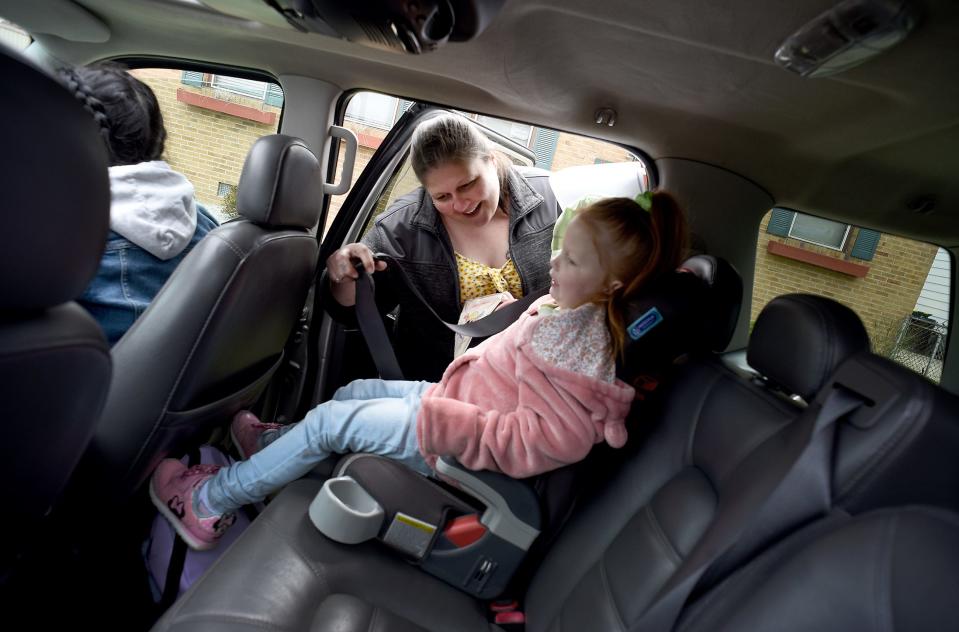
“I’ve been on my own ever since, and I’ve always felt isolated, like nobody could help me. Every time I needed help, there was no one around. Even when I would talk to the therapists, they were listening to my mom talk. They weren’t listening to me.
“After being diagnosed with depression, I was on quite a few medications. They would put me on mood stabilizers and stuff to help me sleep because I had nightmares or recurring dreams. I was on four or five types of anti-depressants because they didn’t seem to be working and I was still having suicidal thoughts. It wouldn't go away.”
By the time Ramirez was 18, she was working, but her life was turbulent. She bounced back and forth, living on her own, then staying with friends.
“I was just trying to survive,” she said.
She’s tried 11 times to commit suicide.
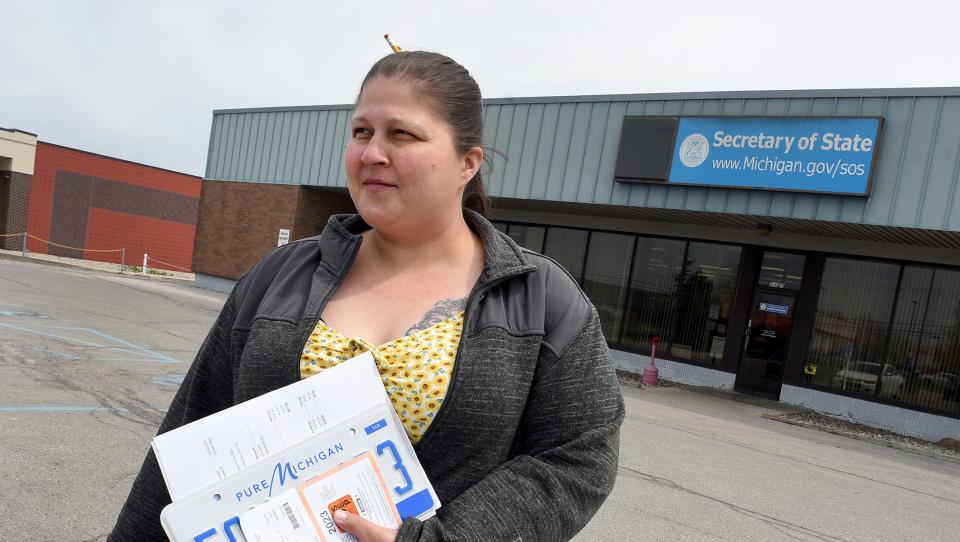
“When I was 19, I drank a fifth of vodka and took a bunch of Vicodin and I woke up,” she said. “I knew I had some kind of purpose and that I would try to figure it out.”
Ramirez managed to get her GED and obtain a medical assistant certificate. She was offered a job after completing her internship. She got an apartment in Detroit, where she lived with her younger brother, Manny. Then, at 24, she found out she was pregnant. Her best friend was the baby’s father.
“She was beautiful. When I had her, I didn’t have anybody. No friends. No family,” she said. “Most people, when they have a baby, have their sister or mom come help them. I had no one.”
But just weeks after bringing her little girl home, the baby was attacked by a dog that'd been let into the house without Ramirez's knowledge.
“I turned around to screaming and crying and then my daughter stopped crying. The dog had my daughter. … I tried to kill that dog. I tried to stab it. … My daughter laid there on the floor. Her face was gone but she was still alive. I can’t get that image out of my head.”
Ramirez carries those images with her everywhere she goes. Now, along with her depression, she has post-traumatic stress disorder, a mental condition triggered by a terrifying event.
“I was doing anything I could to numb the pain because it literally felt like a part of me was gone and that no one understood,” she said. “The hardest thing in the world is to bury your child.”
She started drinking, popping pills, smoking weed and using cocaine.
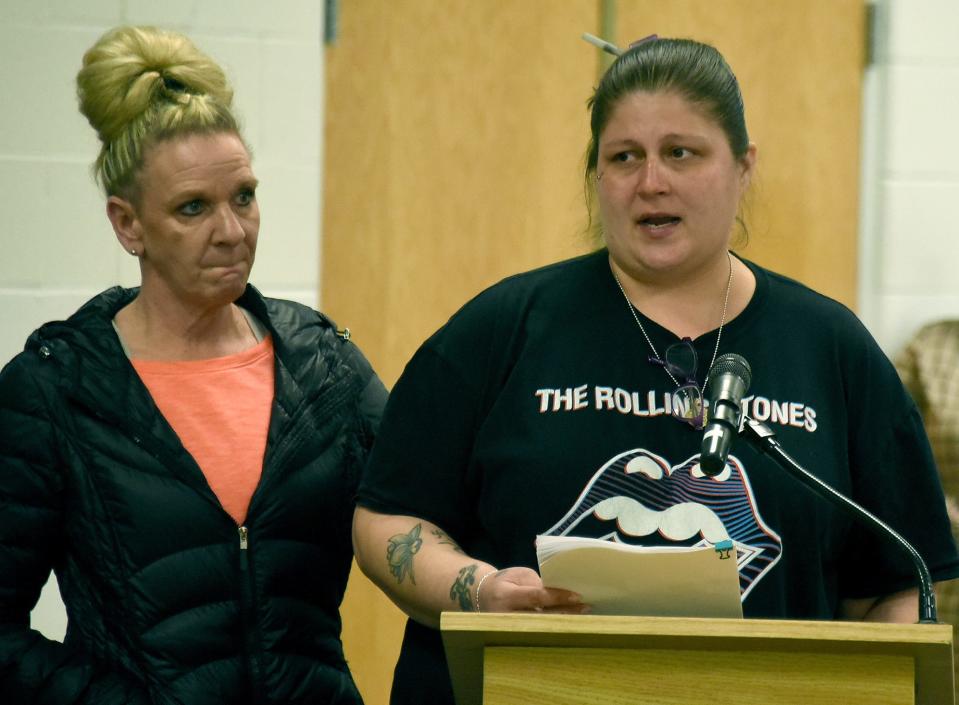
Rainbow baby
When she found out she was pregnant a second time, Ramirez knew she had to make some drastic changes.
“I knew I had to bring myself up,” she said. “She's worth more. She's my rainbow baby.”
The term is used for a healthy baby born after losing a baby due to miscarriage, stillbirth, neonatal death or infant loss.
While Ramirez was pregnant, she stayed with family and took a bus to work. She admits, as she stood on the bus, she was sometimes barraged with images of going through the windshield, or walking down the street and getting hit by a car.
“It’s hard to deal with things like that and go to work and act like nothing is wrong,” she said.
When she sought help, her counselors advised her to use coping mechanisms.
“I already do that. I crochet. I paint. I write. I listen to music. I meditate. It’s not helping,” she said. “I’m told to keep doing what I’m doing but it’s scaring me. I don’t want to keep seeing these things. How do I stop them?”
Her child is 4 now. In the few months they've been at the homeless shelter, Ramirez has worked with a peer recovery support specialist through Monroe Community Mental Health Authority. She’s managing her mental health with medication and waiting to see a doctor.
She’s had one consultation with a physician. It was over the phone.
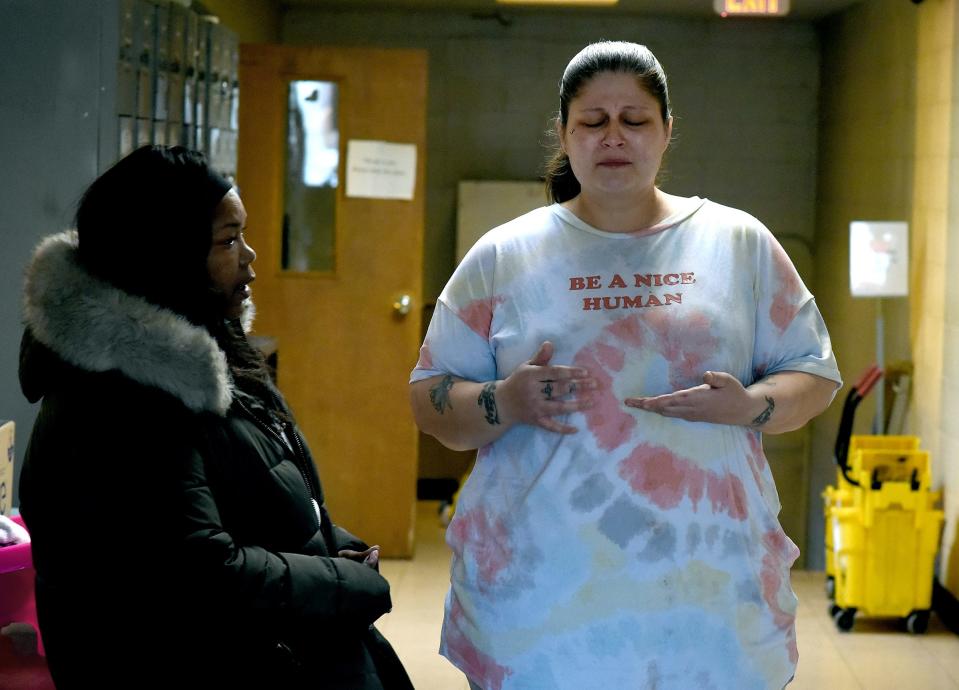
“That’s the stigma with mental health. I’m medicated. I take an anti-depressant, a mood stabilizer and a tranquilizer to sleep,” she said. “I have to wait three months to see a psychiatrist and talk for 10 minutes so he can tell me if I’m depressed. Then he can increase my medication. How is that helping me? I still have dreams. I can’t walk down the street without a dog barking and I relive it in my mind. I can’t hear a child cry without being triggered.”
With support from the staff at Oaks, Ramirez is going to school and trying to secure a home of her own. She recently started working and bought a 2003 Ford Explorer.
“The people here at Oaks have made me feel wanted. They take the time to listen. They uplift me and encourage me,” she said. “They want me to get the mental health help I need. They give me hope.”
As Ramirez focuses on getting back on track, she's advocating for others suffering with the invisible disability of mental illness.
She recently spoke at the MCMHA board meeting, sharing her story and making a plea for mental health support and services.
“Everything I’ve been through is leading to something bigger, and I still don’t know what that is. I want to be able to get up in the morning, have my coffee, make my daughter breakfast and get her ready for school and go to work,” she said.
“I want to pick her up from school, come home, have dinner and do it all over again. I can’t do that just trying to survive. I’ve been surviving for so long. I’m ready to live.”
— Contact reporter Lisa Vidaurri Bowling at LVidaurriBowling@gannett.com.
Mental health awareness
May is Mental Health Awareness Month and May 18 is Mental Health Action Day, a day to take time for yourself, the people you love and your community.
According to the Centers for Disease Control and Prevention, more than 1 in 5 adults in the United States live with a mental illness. About 1 in 25 adults live with serious mental health disorders like bipolar disorder, major depressive disorder or schizophrenia.
Did you know?
• There is no single cause for mental illness.
• Mental health includes your emotional, psychological and social well-being.
• There are more than 200 types of mental illnesses and disorders.
• Poor mental health increases the risk of chronic diseases like cancer, heart disease and stroke.
• Common mental health disorders diagnosed in children include attention-deficit/hyperactivity disorder (ADHD), anxiety and behavior disorders.
• Half of all mental illnesses occur before a person turns 14 years old.
• Mental health is important from childhood through adulthood.
• Mental illness can be treated.
If you or someone you know needs support, call or text 988. The suicide and crisis lifeline provides 24/7 free and confidential support for anyone in distress.
This article originally appeared on The Monroe News: Mental illness hasn't stopped Maricella Ramirez

